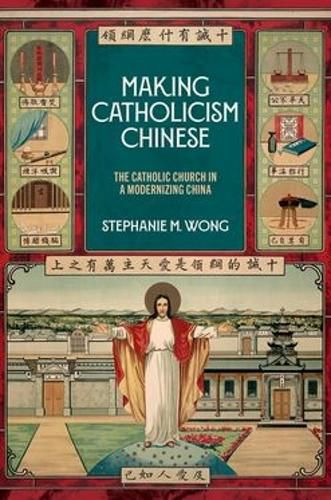Readings Newsletter
Become a Readings Member to make your shopping experience even easier.
Sign in or sign up for free!
You’re not far away from qualifying for FREE standard shipping within Australia
You’ve qualified for FREE standard shipping within Australia
The cart is loading…






Making Catholicism Chinese examines a little-known chapter of Catholic life in China, when a coalition of foreign-born and Chinese Catholics strove to make the Church indigenously "Chinese." This book demonstrates how the indigenization movement, begun as a bid to render Catholicism a Chinese religion, came to support Chinese state-building instead.
In the first half of the 20th century, China transformed from a faltering and semi-colonized empire to a tentatively pluralistic republic to an increasingly militarized one-party state. Religious communities were driven to "modernize" for the sake of the new nation. In the case of Catholicism, the Belgian-born Lazarist Vincent Lebbe most publicly advocated for a Chinese Church, though the wider movement was guided by an array of Chinese clergy, newspaper magnates, scholar-politicians, artists, and army medics and combatants striving in various ways to be both faithful Catholics and patriotic citizens. Their indigenization project coincided with a national embrace of modernity as an ideal, leading Catholics to take up a variety of causes: promoting Chinese clergy as bishops in opposition to French dominance in the missions, experimenting with new forms of education and mass media, and ultimately joining the right-leaning Nationalist regime's war effort against Japan. Stephanie Wong thoroughly documents this history and definitively shows that the movement failed to establish the local Church as a distinct Chinese religion
$9.00 standard shipping within Australia
FREE standard shipping within Australia for orders over $100.00
Express & International shipping calculated at checkout
Making Catholicism Chinese examines a little-known chapter of Catholic life in China, when a coalition of foreign-born and Chinese Catholics strove to make the Church indigenously "Chinese." This book demonstrates how the indigenization movement, begun as a bid to render Catholicism a Chinese religion, came to support Chinese state-building instead.
In the first half of the 20th century, China transformed from a faltering and semi-colonized empire to a tentatively pluralistic republic to an increasingly militarized one-party state. Religious communities were driven to "modernize" for the sake of the new nation. In the case of Catholicism, the Belgian-born Lazarist Vincent Lebbe most publicly advocated for a Chinese Church, though the wider movement was guided by an array of Chinese clergy, newspaper magnates, scholar-politicians, artists, and army medics and combatants striving in various ways to be both faithful Catholics and patriotic citizens. Their indigenization project coincided with a national embrace of modernity as an ideal, leading Catholics to take up a variety of causes: promoting Chinese clergy as bishops in opposition to French dominance in the missions, experimenting with new forms of education and mass media, and ultimately joining the right-leaning Nationalist regime's war effort against Japan. Stephanie Wong thoroughly documents this history and definitively shows that the movement failed to establish the local Church as a distinct Chinese religion